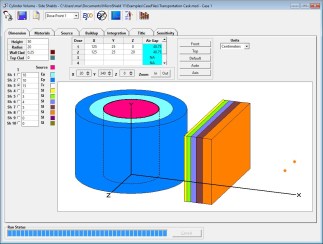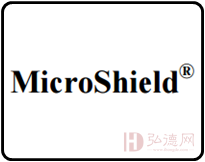- 热销商品
- 热门关注
-
热销:0 套
询价
-
热销:0 套
询价
-
热销:0 套
询价
-
热销:0 套
询价
-
热销:0 套
询价
-
0 人关注
询价
-
0 人关注
询价
-
0 人关注
询价
-
0 人关注
询价
-
0 人关注
询价
- 商品介绍
- 商品评价
- 商品编号 -
- 品牌 无品牌
MicroShield®是一款辐射剂量计算软件,它广泛应用于屏蔽体设计与屏蔽外参考点剂量率计算等方面。 该软件有16种源项模型并自带含12种屏蔽材料的材料库以及含大量放射性核素的核素库,用户还可以根据工程需要自行添加屏蔽材料,这些功能使用户在建模时有更广泛的选择范围。
MicroShield®除了重视建模、核素参量输入等功能外,其结果是以Microsoft Office®方式输出,方便用户对计算结果进行后续应用。

MicroShield®是交互式的,并利用广泛的输入错误检查。集成工具提供结果图,材料和源文件创建,具有衰减的源推断(考虑衰变和子堆积的剂量——Ci计算),衰减的暴露率与实践的预测,材料和核素数据的访问和衰变热计算。
MicroShield®现在有两个不同的版本:MicroShield® Pro和MicroShield® LT。MicroShield® Pro提供MicroShield®软件的全部功能以及各种源,衰变和其他剂量评估工具。MicroShield® LT提供了基本的三维解决方案算法和基本功能。
MicroShield®功能比较:
| MicroShield® LT | MicroShield® Pro | |
| MicrosoftWindows® 10的兼容性 | √ | √ |
| 支持数字格式 | √ | √ |
| 3D MicroShield ®解决方案引擎 | √ | √ |
| 16种不同的几何形状 | √ | √ |
| SI和英制单位输入 | √ | √ |
| 多达30种成分的定制材料 | √ | √ |
| 包括超过60种基于NIST,ANSI/ANS-6.4.2-2006等的定制材料 | √ | √ |
| ICRP 38& 107核素来源 | √ | √ |
生成子产品的源项衰变 | √ | √ |
| 基于ICRP 21、51、71&116 DCF的多次剂量结果 | √ | √ |
| 批处理工具 | √ | √ |
| 结果导出到Microsoft® Word和Excel | √ | √ |
| 灵敏度工具 | √ | √ |
| 几何形状的多层堆积系数 | √ | |
| 几何的累积因子敏感性 | √ | |
| 外部来源工具 | √ | |
| 源推理工具 | √ | |
| 曝光率工具 | √ | |
| 衰减热工具 | √ | |
| 材料与核数据查看器 | √ | |
| 可用的站点 | √ | |
| 静默安装和SCCM支持 | √ |
MicroShield®通用功能
16个几何形状,适应偏移剂量点和10个标准屏蔽加上源自屏蔽和圆柱包层
输入尺寸时,将重新调整输入的几何显示。尺寸数据以米,厘米,英尺或英寸为单位
更新的数据(放射性核素,衰减,累积和剂量转换)反映了ICRP 38和107以及ANSI / ANS标准和RSICC出版物的标准数据
剂量转换因子ICRP出版物116吸收剂量率和来自ANSI / ANS -6.1.1-1977的剂量转换因子
基于NIST,ANSI / ANS-6.4.2-2006等定制材料
自动和同时计算积累和未积分的结果
可以为情况设计和保存巴中自定义材料,已添加到十二种内置材料中
可以创建和保存源并在案例之间移动源,可以是核素或能量,也可以是浓度或总数。提供了几种光子分组方法,自定义(用户定义)。
可以使用生成的子产品计算源衰减
可以使用25个能量组(能量范围为15keV至10MeV);输入可以是集中或总计
可以研究曝光速率对时间,光源尺寸,屏蔽厚度或距离的灵敏度。可以对正交顺序敏感地进行积分转换验证
可以计算衰变热/能量
能够使用数字格式(十进制逗号等)
几何源配置
点
线
磁盘
矩形区域 - 垂直
矩形区域 - 水平
球
气缸容积 - 侧挡板
气缸表面 - 端罩
气缸表面 - 内部剂量点
气缸表面 - 外部剂量点
环形气缸 - 内部剂量点
环形气缸 - 外部剂量点
矩形体积
截断锥
平面
平板
MicroShield V12新功能:
MicroShield V12多屏蔽累积因素计算,以及结果导出到Microsoft Word的新版本和Excel。
更快的计算运行时间。
Microsoft Windows® 10的兼容性
安装过程已得到增强,现在与Microsoft®系统配置管理器兼容
也可以静默的执行安装过程
添加了检查更新以允许用户检查新的更新
系统要求
Windows® 10
Internet Explorer®版本8.0及更高版本
英文介绍
MicroShield® is a comprehensive photon/gamma ray shielding and dose assessment program that is widely used for designing shields, estimating source strength from radiation measurements, minimizing exposure to people, and teaching shielding principles.
MicroShield® is useful to health physicists, waste managers, design engineers, and radiological engineers and only requires a basic knowledge of radiation and shielding principles.
MicroShield® is fully interactive and utilizes extensive input error checking. Integrated tools provide graphing of results, material and source file creation, source inference with decay (dose-to-Ci calculations accounting for decay and daughter buildup), projection of exposure rate versus time as a result of decay, access to material and nuclide data, and decay heat calculations.
MicroShield® Version 12 Lastest Features:
MicroShield® V12 includes multi-shield buildup factor calculations as well as
Export results into the latest versions of Microsoft Word® and Excel®
Faster computational run-times
The installation process has been enhanced and is now compatible with Microsoft® System Center Configuration Manager
The installation process can also be performed silently
A Check for Update feature has been added to allow the user to check for the latest update
Full Microsoft Windows® 10 compatibility
MICROSHIELD’S® FEATURES INCLUDE:
Full Microsoft Windows® 8/8.1 (32 bit and 64 bit), Windows® 7 (32 bit and 64 bit), Vista® and XP®compatibility.
Ability to export results into Microsoft Office® applications.
Ability to utilize international numerical formats (decimal commas, etc.).
Current industry standard dose conversion factors including ICRP-116, ICRP-74, ICRP-51 as well as ANSI/ANS-6.1.1.
Sixteen geometries that accommodate offset dose points and as many as ten standard shields plus source self-shielding and cylinder cladding.
The geometry display for entry is re-scaled as dimensions are entered. Dimensional data are accepted in meters, centimeters, feet, or inches.
Library data (radionuclides, attenuation, buildup, and dose conversion) reflect standard data from industry standard radiation libraries ICRP-38 and ICRP-107 as well as ANSI/ANS standards and RSICC publications.
Buildup and uncollided results are both automatically and simultaneously calculated.
Sources may be created and saved and moved among cases (either as nuclides or energies) and as concentrations or totals. Several photon grouping methods are provided including custom (user defined) grouping methods.
Source decay can be calculated with daughter products generated using the same algorithms as found in the RadDecay® software
GEOMETRY – SOURCE CONFIGURATIONS INCLUDED:
Point
Line
Disk
Rectangular Area – Vertical
Rectangular Area – Horizontal
Sphere
Cylinder Volume – Side Shields
Cylinder Volume – End Shields
Cylinder Surface – Internal Dose Point
Cylinder Surface – External Dose Point
Annular Cylinder – Internal Dose Point
Annular Cylinder – External Dose Point
Rectangular Volume
Truncated Cone
Infinite Plane
Infinite Slab
Requirements:
Microsoft Windows® 10
Microsoft® Internet Explorer® Version 8 and above
- 全部评价
- 晒图
- 追评
- 好评
- 中评
- 差评









